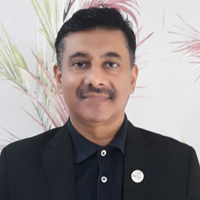Dr. Bhupendra Kumar Rana

In a rapidly evolving healthcare landscape, technology, innovation, and expertise converge to shape the future. Dr. Bhupendra Rana, a distinguished figure in healthcare Accreditation , recently shared his valuable insights on the InnoHEALTH Podcast. His perspectives shed light on the transformative power of digital health, the challenges of modern medicine, and the promising future of healthcare.
A Vision for the Future of Healthcare
Dr. Rana began the conversation by emphasizing the urgent need for healthcare systems to adapt to the rapidly changing world. With the rise of digital health technologies, such as telemedicine, AI-driven diagnostics, and wearable devices, the potential for more personalized and efficient patient care has never been greater. He pointed out that these advancements not only improve access to healthcare but also ensure that patients receive timely interventions, particularly in underserved regions.
Challenges in Digital Health Implementation
Despite the promise of digital health, Dr. Rana acknowledged the significant challenges that come with it. One of the primary hurdles is ensuring that these technologies are accessible and affordable to all, especially in developing countries like India. He stressed that while urban areas may benefit from advanced healthcare tools, rural regions often lag due to limited infrastructure and resources.
Dr. Rana also highlighted the need for regulatory frameworks that can keep pace with technological advancements. Ensuring patient data privacy and security in a digital-first healthcare ecosystem is critical, and he called for robust policies to protect sensitive information.
The Role of AI in Healthcare
Artificial intelligence (AI) featured prominently in the discussion. Dr. Rana elaborated on how AI is revolutionizing diagnostics, treatment planning, and even drug development. From AI algorithms that analyze medical images to predict diseases early, to systems that assist doctors in making more informed decisions, the technology is reshaping the healthcare landscape.
However, Dr. Rana was quick to point out that AI should complement, not replace, human expertise. He emphasized the importance of a balanced approach where AI serves as a tool to enhance the capabilities of healthcare professionals rather than overshadow their critical judgment.
Bridging the Urban-Rural Divide
A significant portion of the conversation revolved around the disparity in healthcare access between urban and rural areas. Dr. Rana expressed concern over the urban-rural healthcare gap, noting that while cities are advancing with state-of-the-art facilities, rural areas still struggle with basic healthcare services. He advocated for more initiatives that bring healthcare technologies to rural communities, whether through mobile health units, telemedicine, or government-led programs.

Education and Training in the Digital Age
Education and training for healthcare professionals were also key points in Dr. Rana’s discussion. With the advent of new technologies, there is a pressing need for continuous learning and upskilling within the medical community. He suggested that healthcare institutions should focus on integrating digital health tools into their curricula and offer regular training sessions to ensure that professionals remain adept at using the latest innovations.
Looking Ahead: A Collaborative Effort
Towards the end of the podcast, Dr. Rana called for a collaborative approach to healthcare innovation. He believes that the future of healthcare lies in the collective efforts of governments, private sector players, and the medical community. By working together, these stakeholders can develop solutions that are not only innovative but also practical and scalable across different regions.
Authors Biography
Dr. Bhupendra Kumar Rana, is the founding CEO of QAI, former Director of NABH, and an expert in healthcare accreditation and quality. He has served on several global committees and authored numerous publications on patient safety and standards.

